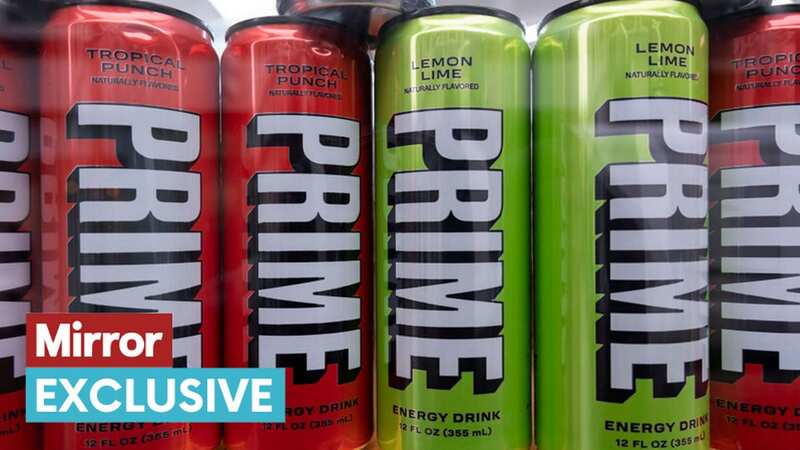Teens to be banned from buying energy drinks such as Prime under Labour plan

Energy drinks will be banned from being sold to under-16s, under plans being considered by Labour.
A clampdown is being looked at because of worries about the impact on children’s health - as well as their education.
The drinks can be packed with high levels of caffeine as well as a lot of sugar. Research suggests that excessive consumption by children is linked to headaches, sleeping problems, irritation and tiredness.
According to evidence, kids regularly having the drinks can lead to poor performance and bad behaviour at school. A study published last month also suggested they could increase the risks of anxiety, stress and suicidal thoughts.
Up to a third of children in the UK consume caffeinated energy drinks every week, with boys more likely to buy them. Products such as Prime Energy, Monster and Rockstar have become increasingly popular.
 Teachers, civil servants and train drivers walk out in biggest strike in decade
Teachers, civil servants and train drivers walk out in biggest strike in decade
Most supermarkets have introduced a voluntary ban on the sale of energy drinks to under-16s. But parents and teachers have raised concerns about how they can be easily bought from corner shops on the way to school.
A complete ban on sales to under-16s was proposed in 2019, but ministers have failed to take action. Countries including Latvia and Lithuania have already banned the sale of energy drinks to children.
A can of Rockstar contains 200mg of caffeine, Monster has 160mg, while Prime Energy has 140mg. That’s around double the roughly 80mg found in a mug of coffee.
Labour has been discussing the idea of a ban on sales to under-16s as it pulls together its election manifesto.
Over 40 health organisations and experts including the Children's Food Campaign last month wrote to both the Health Secretary Victoria Atkins and her Labour counterpart Wes Streeting to call for a ban to be introduced urgently. Signatories to the letter included the Royal College of Paediatrics and Child Health, British Dental Association, Diabetes UK, and the British Medical Association.
Barbara Crowther of the Children's Food Campaign said: “Energy drinks companies shouldn't be allowed to increase profits at the expense of child health. The government said it would ban the sale of energy drinks to under 16-year-olds five years ago but didn't actually do it. All evidence points to these over-caffeinated drinks being harmful to children's health.
"There is a lot of support for this measure from supermarkets who are already restricting sales to children voluntarily - to protect children properly there needs to be an outright ban in all sales outlets. With evidence growing on both mental and physical harms of these drinks, it’s time for action.”
Teaching unions have spoken about the role energy drinks can play in poor pupil behaviour and how they present a barrier to learning. NASUWT General Secretary Patrick Roach last night said: “Energy drinks are readily available legal highs, and consumption by young people should be banned.
“Teachers see every day how high levels of these stimulants are impacting on poor behaviour in the classroom. Consumption by teenagers can also lead to increased risk of poor academic performance, sleep problems, and issues with concentration and behaviour. Despite the Government announcing a ban in 2019 it never saw the light of day. A ban on energy drinks is long overdue.”
Sports and energy drinks sales are continuing to boom, with £2.2billion in 2023, up 21.6% on the previous year.
 Richard 'shuts up' GMB guest who says Hancock 'deserved' being called 'd***head'
Richard 'shuts up' GMB guest who says Hancock 'deserved' being called 'd***head'
Parents' horror as child has 'cardiac episode' after drinking Prime Energy
A primary school pupil was admitted to hospital with heart problems after they consumed a Prime Energy drink.
The child had to have their stomach pumped after they suffered a “cardiac episode”. Milton Primary School in Newport, Wales sent a warning to parents in the wake of the incident, which took place at the weekend away from the school.
The Prime drinks brand has become wildly popular with youngsters after being promoted by social media influencers Logan Paul and KSI. Videos have been posted online of supermarkets being swarmed by crowds emptying the shelves after it has come into stock.
A can of Prime Energy contains 140mg of caffiene, which is almost double the around 80mg found in a mug of coffee. It comes in flavours including Orange Mango and Strawberry Watermelon. The drink is not recommended for children under the age of 18, which is stated on the label.
As well as the energy drink that is sold in cans, the brand also makes Prime Hydrate, which comes in bottles and does not contain caffeine.
In a message to parents last May, Milton Primary School wrote: “A parent has reported that their child has had a cardiac episode over the weekend after drinking a Prime energy drink. The child had to have their stomach pumped and, although better now, the parent wanted us to share this as a reminder of the potential harmful effects."
Another school, Bowling Park Primary School in Bradford, last year wrote to parents after energy drinks were brought in by pupils on two occasions. It said: "Please can you support us to ensure our children do not bring energy drinks into school."
Read more similar news:
Comments:
comments powered by Disqus

































